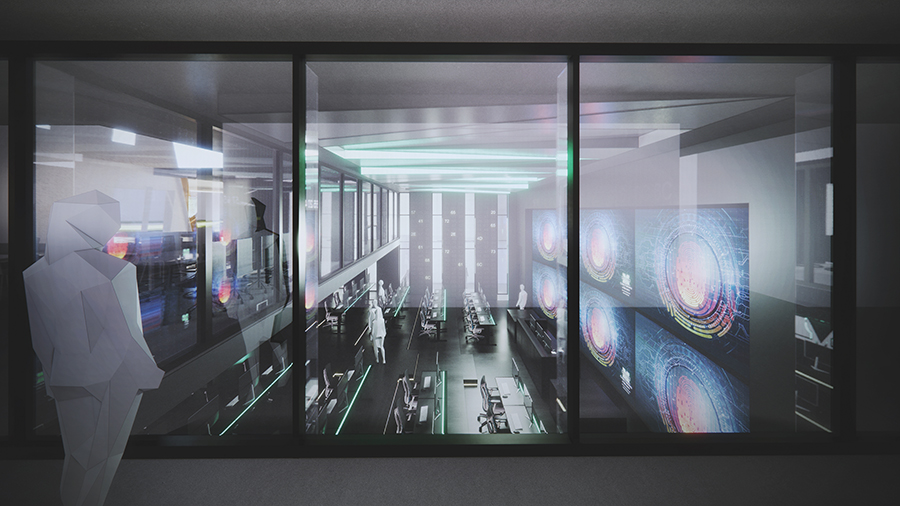The team leading Marshall’s new Institute for Cyber Security focuses on national and international partnerships that prepare students to combat the increasingly complex realm of cyber threats
By Leah Payne
MU 72 | FALL 2024
Forty years ago, the U.S. military was well-trained in identifying enemies through an intricate system of threat assessments. Fast-forward a few decades, and the enemy is now more complicated than ever, due to advancements in technology, digital platforms and cybersecurity tools where malicious actors are operating globally, hidden in the dark web. Cyber adversaries come in many forms and include everything from nation- and state-sponsored actors to hacktivists to lone criminal hackers motivated by money. The complexity and anonymity of the digital world make them difficult to track and combat. Neither governments, militaries nor Fortune 500 companies could have truly envisioned the future of the digital world and the vast opportunities for good and evil that exist today.
Enter Marshall University’s new Institute for Cyber Security, set to become “the hub of East Coast cybersecurity.” It will house the National Center of Excellence for Cybersecurity in Critical Infrastructure, which is modeled after the framework of the University of Texas-San Antonio’s National Security Collaboration Center. Marshall’s location, just a few hundred miles from the nation’s capital, makes it a prime location for a revolutionary, state-of-the-art cyber center, easily accessible by federal government and military officials.
University officials emphasize the importance of a global approach with the new institute, one that includes fostering and maintaining external relationships with foreign partners, ensuring comprehensive collaboration, knowledge exchange and mutual support across international borders. These partnerships were highlighted last April when Marshall students and faculty participated again in Exercise Locked Shields. Hosted by United States Cyber Command’s (USCYBERCOM) Joint Force Headquarters-Department of Defense Information Network (JFHQ-DODIN), it is the largest cyber exercise in the world, with over 40 partner countries and dozens of federal and private sector entities that worked together to secure and defend critical infrastructure through cyberspace.
The importance of collaboration is echoed by partners at the federal level including Bill Walker, chief of staff for USCYBERCOM’s JFHQ-DODIN and a Marshall alumnus, who said even with the money, military might and sophistication of the U.S. intelligence and cyber apparatus, the power of many is essential to fighting today’s sophisticated cyber adversaries.

“In this day and age, everything regarding security and defense in the cyber domain comes down to partnerships,” Walker said. “We know that the Department of Defense cannot do it alone. We need our private sector partners working with our academic partners like Marshall University, West Virginia University and West Virginia State University, among others.”
At the recent West Virginia Chamber of Commerce Annual Business Summit, Walker told the audience there are two types of entities that exist today — those who have been compromised and those who just don’t know it yet.
Marshall’s John Sammons, ICS associate director and professor of Cyber Forensics and Security, agrees that protecting everything and everyone essentially falls under the definition of cybersecurity.
“Most talk about protecting data, devices and networks from unauthorized access, but I don’t think we can or should lose sight that protecting people is also a major part of the big picture,” Sammons said. “The other thing I would say is that the overall cyber domain has significantly expanded. We used to be focused on computers, servers and networks. Today, it’s expanded to include critical infrastructure and the technology used to run, monitor and control it. It includes things like health care, energy, manufacturing, transportation and so much more. This is where the National Center of Excellence and our collaboration with USCYBERCOM come into play.”
Just how common is cybercrime? It’s estimated to happen every 39 seconds and is forecast to cost the world’s economy $10.5 trillion by next year. Whether it’s as simple as a gas card being compromised at the pump or as far-reaching as a large-scale cybercrime taking out a global network, cybercrime is rampant. And there aren’t enough cybersecurity-trained experts currently to handle the load, although Marshall and others are leveling up to meet the challenge.
Historically, under the direction of outstanding academic leaders, Marshall University has excelled at educating students in computer and information technology, computer engineering, management information systems and now cybersecurity. The ICS is a multidisciplinary hub that is leveraging all these programs and more in a laser-targeted effort to meet the world’s defense needs. It’s a mission that Sammons said will benefit students across the university.

“It’s not just a technology problem. It’s a policy problem, a people problem and touches all kinds of different disciplines and all kinds of different folks,” Sammons said. “All of those feed into Marshall’s mission of educating and training the current and future workforce. We are not only expanding cyber offerings here, but we are expanding cybersecurity and awareness across the university — because it literally touches everything.”
Sammons said he expects the university’s multidisciplinary relationships to grow as cyber issues continue to invade politics, health care and business, etc. And it will all be housed in a new 78,000-square-foot facility that will anchor the east end of the Innovation Corridor currently being developed along Fourth Avenue. Plans call for a five-story building with space for academic, private sector, government and military operations, as well as retail space on the ground floor. It is anticipated construction will begin in early 2025 with the center ready for occupancy in early 2027.
For more information on the Institute for Cyber Security and the academic programs at Marshall, visit www.marshall.edu/cyber.





